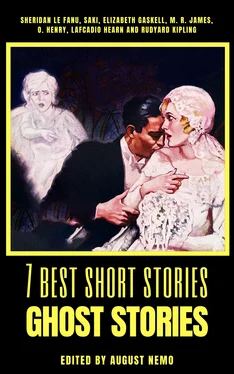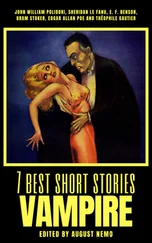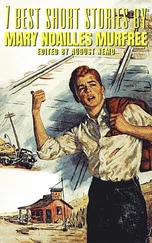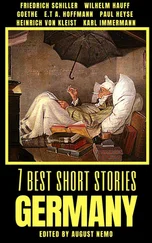Poe's spectres thus acquired a convincing malignity possessed by none of their predecessors, and established a new standard of realism in the annals of literary horror. The impersonal and artistic intent, moreover, was aided by a scientific attitude not often found before; whereby Poe studied the human mind rather than the usages of Gothic fiction, and worked with an analytical knowledge of terror's true sources which doubled the force of his narratives and emancipated him from all the absurdities inherent in merely conventional shudder-coining. This example having been set, later authors were naturally forced to conform to it in order to compete at all; so that in this way a definite change begin to affect the main stream of macabre writing. Poe, too, set a fashion in consummate craftsmanship; and although today some of his own work seems slightly melodramatic and unsophisticated, we can constantly trace his influence in such things as the maintenance of a single mood and achievement of a single impression in a tale, and the rigorous paring down of incidents to such as have a direct bearing on the plot and will figure prominently in the climax. Truly may it be said that Poe invented the short story in its present form. His elevation of disease, perversity, and decay to the level of artistically expressible themes was likewise infinitely far-reaching in effect; for avidly seized, sponsored, and intensified by his eminent French admirer Charles Pierre Baudelaire, it became the nucleus of the principal æsthetic movements in France, thus making Poe in a sense the father of the Decadents and the Symbolists.
Poet and critic by nature and supreme attainment, logician and philosopher by taste and mannerism, Poe was by no means immune from defects and affectations. His pretence to profound and obscure scholarship, his blundering ventures in stilted and laboured pseudo-humor, and his often vitriolic outbursts of critical prejudice must all be recognized and forgiven. Beyond and above them, and dwarfing them to insignificance, was a master's vision of the terror that stalks about and within us, and the worm that writhes and slavers in the hideously close abyss. Penetrating to every festering horror in the gaily painted mockery called existence, and in the solemn masquerade called human thought and feeling, that vision had power to project itself in blackly magical crystallisations and transmutations; till there bloomed in the sterile America of the thirties and forties such a moon-nourished garden of gorgeous poison fungi as not even the nether slopes of Saturn might boast. Verses and tales alike sustain the burthen of cosmic panic. The raven whose noisome beak pierces the heart, the ghouls that toll iron bells in pestilential steeples, the vault of Ulalume in the black October night, the shocking spires and domes under the sea, the "wild, weird clime that lieth, sublime, out of Space--out of Time"--all these things and more leer at us amidst maniacal rattlings in the seething nightmare of the poetry. And in the prose there yawn open for us the very jaws of the pit--inconceivable abnormalities slyly hinted into a horrible half-knowledge by words whose innocence we scarcely doubt till the cracked tension of the speaker's hollow voice bids us fear their nameless implications; dæmoniac patterns and presences slumbering noxiously till waked for one phobic instant into a shrieking revelation that cackles itself to sudden madness or explodes in memorable and cataclysmic echoes. A Witches' Sabbath of horror flinging off decorous robes is flashed before us--a sight the more monstrous because of the scientific skill with which every particular is marshaled and brought into an easy apparent relation to the known gruesomeness of material life.
Poe's tales, of course, fall into several classes; some of which contain a purer essence of spiritual horror than others. The tales of logic and ratiocination, forerunners of the modern detective story, are not to be included at all in weird literature; whilst certain others, probably influenced considerably by Hoffmann, possess an extravagance which relegates them to the borderline of the grotesque. Still a third group deal with abnormal psychology and monomania in such a way as to express terror but not weirdness. A substantial residuum, however, represent the literature of supernatural horror in its acutest form; and give their author a permanent and unassailable place as deity and fountainhead of all modern diabolic fiction. Who can forget the terrible swollen ship poised on the billow-chasm's edge in MS. Found in a Bottle--the dark intimations of her unhallowed age and monstrous growth, her sinister crew of unseeing greybeards, and her frightful southward rush under full sail through the ice of the Antarctic night, sucked onward by some resistless devil-current toward a vortex of eldritch enlightenment which must end in destruction?
Then there is the unutterable M. Valdemar, kept together by hypnotism for seven months after his death, and uttering frantic sounds but a moment before the breaking of the spell leaves him "a nearly liquid mass of loathsome, of detestable putrescence." In the Narrative of A. Gordon Pym the voyagers reach first a strange south polar land of murderous savages where nothing is white and where vast rocky ravines have the form of titanic Egyptian letters spelling terrible primal arcana of earth; and thereafter a still more mysterious realm where everything is white, and where shrouded giants and snowy-plumed birds guard a cryptic cataract of mist which empties from immeasurable celestial heights into a torrid milky sea. Metzengerstein horrifies with its malign hints of a monstrous metempsychosis--the mad nobleman who burns the stable of his hereditary foe; the colossal unknown horse that issues from the blazing building after the owner has perished therein; the vanishing bit of ancient tapestry where was shown the giant horse of the victim's ancestor in the Crusades; the madman's wild and constant riding on the great horse, and his fear and hatred of the steed; the meaningless prophecies that brood obscurely over the warring houses; and finally, the burning of the madman's palace and the death therein of the owner, borne helpless into the flames and up the vast staircase astride the beast he had ridden so strangely. Afterward the rising smoke of the ruins take the form of a gigantic horse. The Man of the Crowd, telling of one who roams day and night to mingle with streams of people as if afraid to be alone, has quieter effects, but implies nothing less of cosmic fear. Poe's mind was never far from terror and decay, and we see in every tale, poem, and philosophical dialogue a tense eagerness to fathom unplumbed wells of night, to pierce the veil of death, and to reign in fancy as lord of the frightful mysteries of time and space.
Certain of Poe's tales possess an almost absolute perfection of artistic form which makes them veritable beacon-lights in the province of the short story. Poe could, when he wished, give to his prose a richly poetic cast; employing that archaic and Orientalised style with jeweled phrase, quasi-Biblical repetition, and recurrent burthen so successfully used by later writers like Oscar Wilde and Lord Dunsany; and in the cases where he has done this we have an effect of lyrical phantasy almost narcotic in essence--an opium pageant of dream in the language of dream, with every unnatural colour and grotesque image bodied forth in a symphony of corresponding sound. The Masque of the Red Death, Silence, a Fable, and Shadow, a Parable, are assuredly poems in every sense of the word save the metrical one, and owe as much of their power to aural cadence as to visual imagery. But it is in two of the less openly poetic tales, Ligeia and The Fall of the House of Usher--especially the latter--that one finds those very summits of artistry whereby Poe takes his place at the head of fictional miniaturists. Simple and straightforward in plot, both of these tales owe their supreme magic to the cunning development which appears in the selection and collocation of every least incident. Ligeia tells of a first wife of lofty and mysterious origin, who after death returns through a preternatural force of will to take possession of the body of a second wife; imposing even her physical appearance on the temporary reanimated corpse of her victim at the last moment. Despite a suspicion of prolixity and topheaviness, the narrative reaches its terrific climax with relentless power. Usher, whose superiority in detail and proportion is very marked, hints shudderingly of obscure life in inorganic things, and displays an abnormally linked trinity of entities at the end of a long and isolated family history--a brother, his twin sister, and their incredibly ancient house all sharing a single soul and meeting one common dissolution at the same moment.
Читать дальше

![Коллектив авторов - Best Short Stories [С англо-русским словарем]](/books/26635/kollektiv-avtorov-best-short-stories-s-anglo-thumb.webp)










